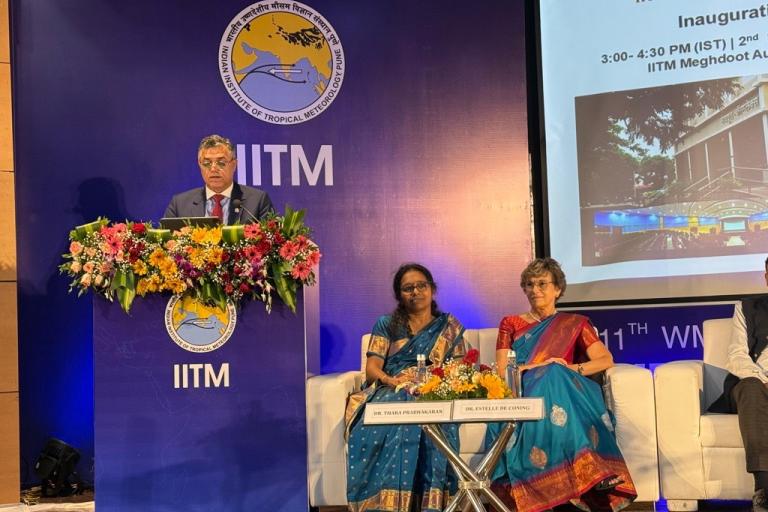WMO President opens the 11th Scientific Conference on Weather Modification in India

Pune, India — Dr Abdulla Al Mandous, President of the World Meteorological Organization (WMO) and Director-General of the United Arab Emirates National Center of Meteorology, inaugurated the 11th WMO Scientific Conference on Weather Modification at IITM in Pune. The conference is a leading global gathering on weather modification, providing a platform for collaboration, knowledge exchange and innovation among researchers and meteorological institutions.
The opening ceremony, held at IITM’s Meghdoot Auditorium, was attended by senior officials and experts in meteorology and climate science, including the Secretary of the Ministry of Earth Sciences, Dr Ravichandran; Dr M. Mohapatra, Director-General of the India Meteorological Department; and the co-chairs of the WWRP Expert Team on Weather Modification, Dr Sarah Tessendorf and Dr Steven Siems. The event also brought together representatives of National Meteorological and Hydrological Services (NMHSs), international organizations and leading research institutions.
Translating research outcomes into practical applications
In his remarks, Dr Al Mandous highlighted the role of scientific innovation in weather modification research for water and food security. He stressed that continued research and technological development are essential to address the growing challenges posed by climate change. He also emphasized WMO’s commitment to supporting capacity development and the exchange of scientific knowledge among WMO Members to translate research outcomes into practical applications to mitigate drought and water scarcity.
Dr Al Mandous noted that this year’s conference comes at a critical moment as the world faces more frequent extreme weather events and rising demand for effective rainfall-enhancement technologies. He reaffirmed that international cooperation in meteorology is fundamental to achieving the United Nations Sustainable Development Goals and highlighted the UAE’s contribution through the UAE Research Program for Rain Enhancement Science, alongside WMO’s role in fostering standards, coordination and good practice.
“Weather modification, once considered a niche area, has evolved into a multidisciplinary domain that intersects atmospheric science, hydrology, socioeconomics and ethics. The WWRP is proud to support this conference, which exemplifies our Weather Modification Expert Team’s commitment to advancing weather science through international collaboration, rigorous research and operational relevance,” said Estelle de Coning, Chief of the World Weather Research Programme (WWRP), in her opening remarks.
Dr de Coning noted the approval of the updated WMO Statement on Weather Modification by the 79th Executive Council in June 2025. The revised statement reflects the latest scientific understanding, addresses emerging technologies and concerns, and reaffirms WMO’s commitment to transparency, international cooperation and responsible governance in weather modification activities. “It provides a strong foundation for the discussions we will have this week and for the future direction of our work,” she added.
As part of his visit, Dr Al Mandous and the accompanying delegation toured IITM’s Cloud Physics Wind Tunnel Laboratory and Fluid Dynamics Laboratory, where they reviewed advanced experimental systems used to study cloud formation, turbulence and aerosol–precipitation interactions. They were briefed on recent advances in laboratory simulations of weather processes, including the use of laser-based instruments and wind tunnels to assess the efficiency of seeding materials. The visit underscored India’s growing capabilities in high-resolution modelling and laboratory-based weather-modification research aimed at improving rainfall efficiency and reducing hazards such as fog and severe storms.
Dr Al Mandous praised the progress achieved by IITM’s research facilities and expressed appreciation for the Ministry of Earth Sciences’ strong commitment to applied meteorological research. He noted that UAE–India collaboration serves as a model of knowledge sharing and scientific partnership, strengthening regional preparedness and resilience to climate challenges.
The five-day conference features more than 16 sessions and workshops on topics including precipitation enhancement, hail and fog suppression, marine cloud brightening, research on climate-intervention approaches and AI-driven forecasting, as well as discussions on the ethical, legal and social implications of weather-modification technologies. The programme also explores how satellite data, uncrewed aerial vehicles (UAVs) and intelligent systems are transforming cloud-seeding operations and supporting real-time decision-making for meteorological services.
Bringing together scientists, policymakers and technology experts, the event provides a global platform to share findings from recent field campaigns and laboratory studies. It reinforces WMO’s mission to foster international collaboration, standardize best practices and advance the responsible use of weather-modification technologies for the benefit of society and the environment.
The opening ceremony concluded with a traditional lamp-lighting. Participants underscored continued cooperation among WMO, India’s Ministry of Earth Sciences and IITM to advance scientific innovation, sustainability and resilience through meteorology and atmospheric research.
About the 11th WMO Scientific Conference on Weather Modification
The 11th WMO Scientific Conference on Weather Modification (3–7 November 2025, Pune, India) is a global forum for advancing the science, technology and policy of weather modification. Hosted by the Indian Institute of Tropical Meteorology and organized under the auspices of the WWRP Expert Team on Weather Modification, the conference convenes scientists, policymakers, operational experts and stakeholders from around the world to share the latest research, operational experience and emerging technologies.
- WMO Member:
- India
- Region:
- Region II: Asia

